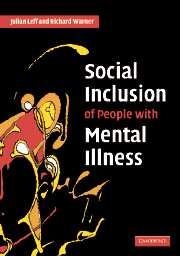Book contents
- Frontmatter
- Contents
- Preface
- 1 Introduction: barriers to social and occupational integration
- Part I The origins of stigma
- Part II Overcoming obstacles to employment
- 9 Why work helps
- 10 Economic obstacles to employment
- 11 The spectrum of work programmes
- 12 Social firms
- 13 Innovative strategies
- 14 Inclusion and empowerment of consumers
- References
- Index
14 - Inclusion and empowerment of consumers
from Part II - Overcoming obstacles to employment
Published online by Cambridge University Press: 24 October 2009
- Frontmatter
- Contents
- Preface
- 1 Introduction: barriers to social and occupational integration
- Part I The origins of stigma
- Part II Overcoming obstacles to employment
- 9 Why work helps
- 10 Economic obstacles to employment
- 11 The spectrum of work programmes
- 12 Social firms
- 13 Innovative strategies
- 14 Inclusion and empowerment of consumers
- References
- Index
Summary
Consumer advocacy
Among the most important developments in psychiatry in the past 30 years, some would argue, has been the growth of organisations of relatives of people with serious mental illness. In the USA, the National Alliance for the Mentally Ill has lobbied for improvements in services for people with mental illness, for the direction of psychiatric resources towards those with the most severe disorders, and for increased research on schizophrenia. Media reports on mentally ill people have become less negative in response to a drive by the Alliance to establish a new openness and tolerance of psychiatric illness. In Britain, the National Schizophrenia Fellowship, now known as Rethink, established a few years earlier than its US counterpart, has been similarly active in providing support for its members, lobbying for needed services, fostering public education and sponsoring research. Its publications have covered such topics as inadequate services, mental health law and the importance of work for mentally disabled people. In Australia, SANE has mounted a strong countrywide anti-stigma campaign and is involved closely in the shaping of mental health policy.
There has also been growth in the organisation of primary consumers of mental health services in recent decades. The consumer, consumer/survivor or service-user movement, while gaining prominence in many parts of the world, is somewhat fragmented in comparison with the relatives' network.
- Type
- Chapter
- Information
- Social Inclusion of People with Mental Illness , pp. 156 - 165Publisher: Cambridge University PressPrint publication year: 2006



